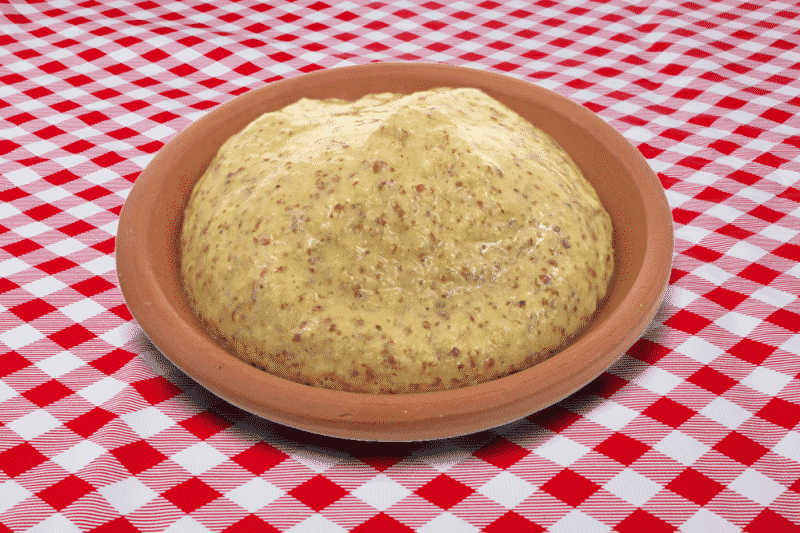
DISCLOSURE: This post may contain affiliate links, meaning when you click the links and make a purchase, I receive a commission. As an Amazon Associate I earn from qualifying purchases.
Creole mustard is a fantastic ingredient that adds immense flavor to salads, sauces, soups, dressings, and many other meals. Unfortunately, the massive popularity may often lead to your local grocery store running out.
Don’t worry! We’ve got you covered with the best Creole mustard substitutes available. Read on to find out how to keep your recipe and tastes intact no matter what. We’ve also got two tasty Creole mustard recipes coming up.
What Exactly Is Creole Mustard And How Is It Made?
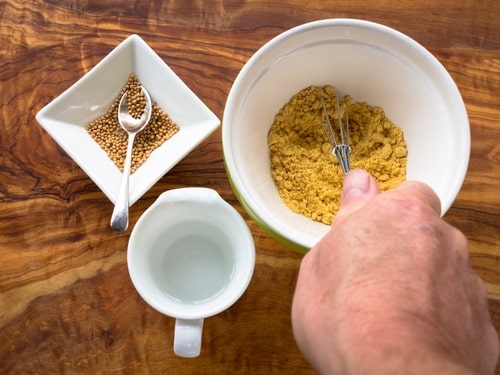
Before we hop on our hot list of Creole mustard substitutes, let’s first give you a brief idea about what makes this variety such a favorite.
The Southern regions of the USA hold Creole mustard as a firm favorite condiment making it readily available in most areas of the States. Its spicy, rich flavor is genuinely one-of-a-kind.
Creole Mustard Flavor
Creole mustard is basically a spicy and intense creamy flavored version of regular mustard. The recipe infuses a range of extra tastes loved by the South, incorporating mustard with the sweetness of honey, hints of cayenne, horseradish, and garlic.
Creole Mustard Texture
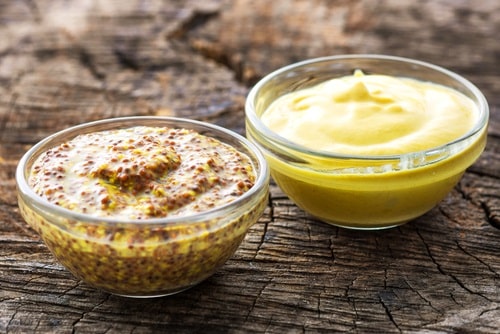
Although decadently creamy, Creole mustard has a grainy texture. It’s a flavor inspired by the tastes of German, French, Spanish, and African mustards, delivering an unmistakable spiciness quite unlike anything else.
Expect much tangier mustard than other varieties, with notes of hotness similar to horseradish coming through strong.
How Creole Mustard Is Made
The basic recipe for Creole mustard is straightforward. Creole mustard is a mix of brown mustard seeds and either maltose or molasses combined with various herbs, a pinch or two turmerics, and red and black peppers marinated in vinegar.
Making your own at home is easy – we’ve got a must-try DIY Creole mustard recipe coming up.
Serving Suggestions For Creole Mustard

Tangy Creole mustard is an amazing food that’s incredibly versatile. It’s used extensively in mustard sauces, sandwich sauces and spreads, dips, salad dressings, and seasoning mixes. Most find this Southern staple as suited to all types of meals.
From fish to meat and vegetables, Creole mustard compliments the flavor of a range of various recipes. You can even spice up a plain piece of grilled bread, turning it into a tasty snack with just a light spread.
6 Best Creole Mustard Substitutes
[amazon box=”B002EJZ1FE”]
The depth of flavor and complex taste made finalizing the six best alternatives to Creole mustard quite taxing. However, we sifted through all of the options and are happy to present the best Creole mustard substitutes available.
1. Homemade Creole Mustard – The Easiest Alternative For Artificial Creole Mustard
There’s no better substitute for store-bought Creole mustard than making it yourself. We’ve got two essential Creole mustard recipes for you to try.
- Easy Creole Mustard Recipe
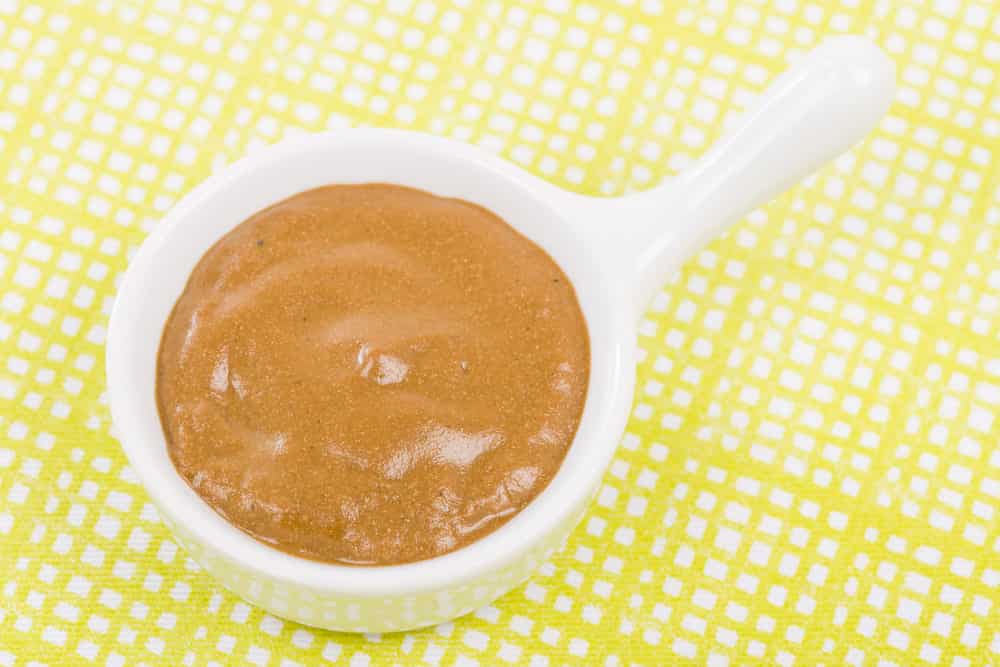
The easy Creole mustard recipe will be the quickest to make, and the taste comes pretty close to the traditional method.
Ingredients:
-
- 6 Tablespoons Dijon Mustard
- ½ Tablespoon Worcestershire Sauce
- 3 Tablespoons Hot Sauce (Tabasco or any spicy alternative)
Method:
Combine the ingredients mixing thoroughly to create a new sauce, and you’ll have the most accessible alternative to Creole mustard around.
- Authentic Creole Mustard Recipe

It’ll take a lot more time and effort, but once you’re done with this authentic Creole mustard recipe, you may never want to repurchase another bottle. There’s nothing like homemade mustard.
Ingredients:
-
- 1 Cup White Wine / White Wine Vinegar
- 9 Tablespoons Yellow Mustard Seeds
- 9 Tablespoons Brown Mustard Seeds
- 1 Teaspoon Salt
- 1 Teaspoon Ground Ginger
- 1 Pinch Allspice
- 1/4 Teaspoon Cayenne Pepper
- 1 1/4 Teaspoons Honey
- 3 Cloves Garlic (Minced)
- 3 Teaspoons Horseradish (Finely Chopped)
Method:
- Combine the vinegar, mustard seeds, ginger, salt, allspice, and cayenne pepper.
- Cover the mixture and leave it to stand, allowing the seeds to absorb the liquid over 24 hours.
- Blend the mixture with garlic, horseradish, and honey in a blender or food processor.
- Pulse until you reach the consistency desired – please note, it will not go completely smooth.
- Transfer your mustard to a sealed container and store it in the fridge for up to three months.
2. Extra Grainy Creole Mustard – Another Commendable Alternative For Creole Mustard
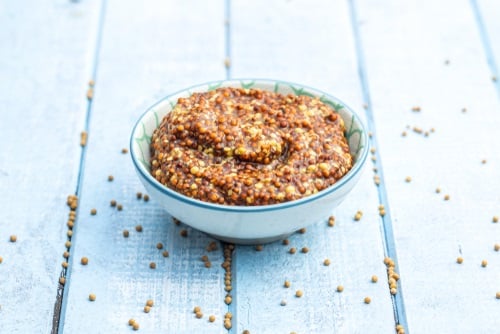
Extra grainy Creole mustard is often preferred over the regular condiment due to its intensity of flavor. Bolder, tangier and spicier, be on the lookout for extra grainy if you can’t find smooth consistency mustard in your grocery store.
Alternatively, whip up your own and add extra mustard seeds to the recipe to reach the grainy texture desired.
3. Whole Grain Creole Mustard – A Quality Replacement For Creole Mustard
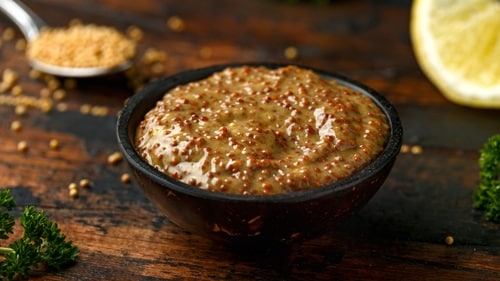
Whole grain Creole mustard is even richer and spicier than the extra grainy version. The mustard is ground from whole seeds, creating a thick, intense paste.
If you’re used to artificial Creole mustard, the strong flavors may be tangier than you expect. However, this makes it the perfect addition to marinades and anything else calling for pungency.
4. Hot Mustard – A Good Alternative For Creole Mustard
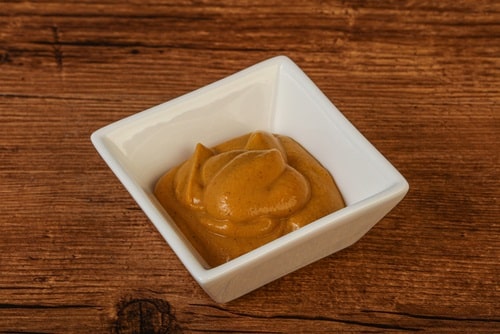
Hot mustard has a similar level of spice, making it a worthy Creole mustard substitute. Be on the lookout for either hot American, English, or German mustard, while spicy brown mustard is another good option.
It’s a little hotter than Creole, but the flavor makes for the ideal alternative to use in sandwich sauces and spreads and pizza dips.
5. Dijon Mustard – A Competent Alternative For Creole Mustard
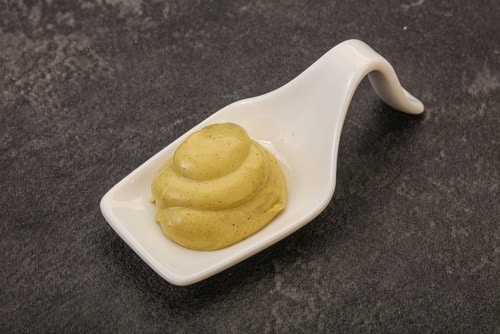
Dijon mustard is one of the most popular Creole mustard substitutes, thanks to its neutral, versatile flavor. This low acidity mustard delivers the perfect balance of tanginess, sharpness, and flavor with just enough spice.
It’s not as hot as Creole, but all the flavor notes are a near-match. Most supermarkets and grocery stores have dijon mustard readily available no matter where in the world you may be located.
6. Beer Mustard – A Hot, Spicy Creole Mustard Alternative
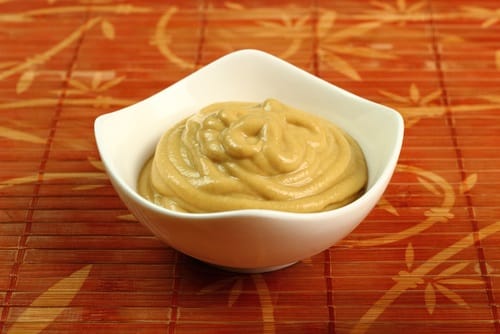
Instead of using vinegar to extract the taste of the mustard seeds, this Creole mustard substitute uses beer to unlock rich, complex flavors. Beer mustard is less acidic but much hotter than other varieties. It’s very spicy and much stronger than Creole.
Spirit mustards are also available and often come even hotter than beer mustard. Give these tasty types of mustard a try on sandwiches and salad dressings, and try pairing meals with a glass of beer or a drink with the spirit used to bring out the full taste.
A Creole Mustard Substitute For Every Occasion
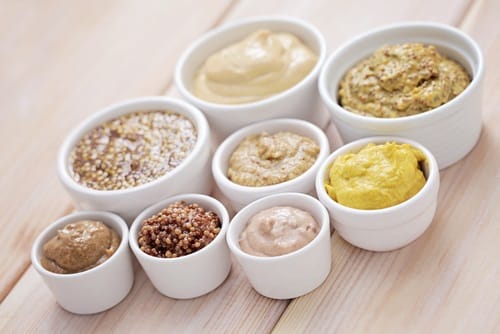
Armed with these six best Creole mustard substitutes, no recipe can go wrong. Creole mustard is a tasty condiment that may just become your new favorite.
We encourage you to try them all out to always know which is best suited to the taste of whatever you may be eating. Which is the best for you? We encourage you to share your opinion in the comments below.